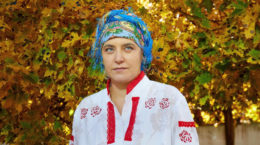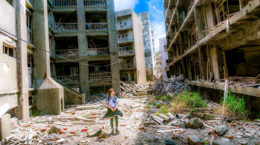Russia’s war against Ukraine has been going on for 9 years already – since 2014. During all that time, Aliaksandr Lukashenka has been skillfully using the tribulation of the neighboring country to solve demographic problems of Belarus. The only thing is, those problems are the result of his rule.
Belarus is dying out, there are no people to work
It is not intimidation; it is the reality. The sad demographic reality of our country. As evidenced by Belstat (statistical committee of Belarus), in only one year, 2022, the population of Belarus went down by almost 55 thousand people. Now (well, as of January 1, 2023) the population of Belarus constitutes 9,200,617 people. It turns out, in Belarus in the last year only, such a district centre as, let’s say, Kobrin, died out completely. Moreover, in two years, the population of Minsk has become less than two million people, and the population of Grodno and Mogilev regions were reduced to less than a million each.
Let’s continue with the statistics. 7.212 million Belarusians are city dwellers, 1.988 million live in rural areas. It turns out, in the past year, the population of the cities went down by 19.7 thousand people, and the rural one – by 35.2 thousand. The country is dying at a much faster rate than the city!
However, the record in the population decline was set in 2021, when our country lost 94.1 thousand people (the losses in 2020 constituted 60.6 thousand). The reasons are clear: the death rate from COVID-19 was added up with repressions after the failure of the Belarusian revolution and the mass emigration of the protest participants that followed. According to the estimates of the Parliamentary Assembly of the Council of Europe, in the period from August, 2020, to the beginning of 2023, from 200 to 500 thousand people left Belarus. If we compare all those numbers, it becomes clear: Belstat is lying, and Belarus has lost much more of its residents.
Yet, we do not have other numbers, so let’s take the data of the Belstat as a basis. Let’s remember, that in the first years after the collapse of the Soviet Union (and till 1994) the population of Belarus was steadily growing. While starting from 1995 it began declining. Then, it has kept declining for almost all the time while Aliaksandr Lukashenka has stayed in power. In the result, the population of our country in the recent 30 years has been reduced by more than a million people. Since the year 2000, the country has lost 801 918 of its residents.
Simultaneously with the decrease in total population, the number of people employed in the economy, the workforce, is also declining. Some people die, some emigrate, some retire. Only in the last year, Belarus lost over 70 thousand of people employed in the economy, which can be compared to the population of such towns as Zhlobin or Svetlogorsk.
Nevertheless, a certain break in the declining of the population of Belarus did happen. Thanks to an inflow of migrants in 2014-2017, a slight, but real increase of the population was observed. Have you noticed in which years? The same years, when the war in Ukraine started, and a flow of refugees rushed to Belarus from our southern neighbor. By the way, the situation in 2022 repeated, but we will speak about it further on.
War for some, drift of workforce to factories for others
As far back as in 2014, when the war in Ukraine just started, Aliaksandr Lukashenka began looking for a solution of the issue of lack of specialists for weapons production in Belarus. On September 23, 2014, the chief of Belarus said at a meeting in Minsk: “It is necessary to equip our army with modern, effective, high-precision weapons. … Nobody is going to give or sell what we need today – advanced weapons – even for a lot of money. You can see it in the example of our neighboring Ukraine. Let’s try to make deals with the Ukrainians and work together so that Ukraine’s intellectual and engineering centres and designers do not perish in Ukraine. Now is the right moment… we shall use this moment not only for ourselves, but for external markets as well”.
In practice, however, the “cooperation” looked like that: at the end of September, 2014, a delegation of the defense industry of Belarus consisting of 22 people visited military enterprises in Kyiv, Lviv, Chernihiv and Dnipropetrovsk. Belarusian military industry representatives were interested most of all in plants and organizations (design bureaus, scientific research institutes) connected with production of missiles and their components (target seeking devices, rocket engines, control systems). So, emissaries from Minsk invited Ukrainian specialists from military plants to move to Belarus right with their families. They promised housing and employment to all of them. Gun-makers from Ukraine were later used, e.g., to build Belarusian anti-aircraft weapon systems.
Anyway, it was more of a local episode. The practice that became really mass-scale was the decision of the Belarusian regime to solve their own problems at the expense of the refugees from Ukraine. Those people, streaming to Belarus in the spring of 2014, initially were thinking very highly about the system of “social state” built in Belarus. Until they met the reality of it, of course.
The significant part of Ukrainians was not in a hurry to register in public institutions upon their arrival to Belarus: they were just staying at their relatives’ or friends’ places, getting accustomed to the new location and looking for a job. However, eventually, many of them did come to local migration service offices to get official work and residence permits. At the same time, which is characteristic, very few refugees turned to local state bodies to get an asylum.
The first time when Lukashenka brought up the issue of Ukrainian refugees was as far back as on April 2, 2014. Then, during his visit to the 558th Aircraft Repair Plant in Baranovichi, he said: “The Ukrainian people would come to us. Therefore, we need to think. It cannot be helped; we will have to take some of our brothers and sisters. We’ll see. We’ll take them if we have to”. That was also when Lukashenka ordered to provide housing and employment to all Ukrainian migrants, and if necessary – issue them new documents to substitute the ones they had lost. That is, at that moment, even people without documents, just saying that they were running from the war, were allowed to enter Belarus from Ukraine.
Several months later, on June 24, 2014, speaking about refugees from Ukraine, Aliaksandr Lukashenka made a following public statement: “We need working hands. And we are ready to place them in different parts of our country, give them a roof above their heads and employment”. On August 30, 2014, he signed a decree “Concerning the stay of Ukrainian nationals in the Republic of Belarus”. The document determined the legal status of Ukrainian refugees in social and labour spheres. Thus, according to the decree, it was easier for the citizens of Ukraine to access state benefits, to enroll their children to schools as well as to receive financial support for their maintenance. However, the main thing was that the decree facilitated the employment of Ukrainian refugees. For example, they did not have to confirm their documents about education.
Three years later, in April, 2017, in his annual address to the parliament and the people, Lukashenka summed up the results: “Ukraine is not just our neighbor. It is a brotherly country for us, a brotherly people. We have received over 160 thousand Ukrainian citizens”. According to the estimates of border guards, by 2017 the inflow of relocants from Ukraine to Belarus had stopped. However, what happened to those people in reality?
The Belarusian regime did not hide that the inflow of Ukrainian refugees was a great opportunity to solve a lot of demographic problems of our own country. Therefore, immigrants from Ukraine were sent to live and work in depressed areas, to the outback of Belarus, that lacked doctors (and other medical workers), teachers, and even just workers in local collective farms and state farms, but had a lot of empty housing. Most of the Ukrainian migrants settled down in the south of the Minsk region, and also in the Gomel and Brest regions. However, quite a huge group was redirected to the north, to the Vitebsk region.
At that time, the Belarusian regime really helped Ukrainians running from the war, we cannot deny that. At the same time, it created a gigantic problem. The willful decision of Lukashenka “we shall accept all of them” was not supported by any normative legal acts, only by verbal orders. In the result, the Ukrainian relocants were receiving a very uncertain legal status in Belarus. At the same time, the Ministry of Internal Affairs did not burn with desire to legalize Ukrainians through granting them a refugee status.
“These people do not fall under the criteria for a refugee status as they are not persecuted in the territory of Ukraine for their political views, national identity and so on”, said back in June, 2015, the head of the Citizenship and Migration Department of the Ministry of Internal Affairs of Belarus, Aliaksei Biahun. According to him, citizens of Ukraine got additional protection from deportation for the term of one year.
It’s important to understand that the majority of the Ukrainian citizens arriving in Belarus in 2014-2015 (and then also in 2022) came to the country almost at random, without any idea that they could/should have tried to get a refugee status. In the result, practically all of them got stuck for a long time in an unclear status of labor migrants, without any benefits and preferences that refugees are legally entitled to. Also, that concerned only those who tried to be naturalized officially somehow. Yet, a lot came without counting on any interaction with the state. They came to their friends and relatives, and having minimally settled down, unofficially rented housing and found employment.
The result of all that is that today the migrants from Ukraine in Belarus mostly work in the countryside: at the farms, as teachers at schools, and so on. In addition, medical specialists from Ukraine of any level, from nurses to doctors, also get employment in the country. Less Ukrainians got employment from the local authorities in small towns, mostly at loss-making state enterprises with low salaries and constant shortage of workers. Speaking about Minsk and regional centers, refugees from Ukraine mostly settle down there at their own risk and work unofficially (therefore, without any social protection and security).
It’s important to understand that refugees from Ukraine cannot receive neither scholarships nor pensions in Belarus. According to the Belarusian legislation, they are foreign citizens. In order to receive pensions in the Republic of Belarus, first you need to get the Belarusian citizenship, then bring a certificate from the Ukrainian pensions fund about receiving pension 6 months in advance, and only then the question of pension will be considered. That is, the scheme which is completely unrealizable.
To turn refugees into citizens
Social exclusion of Ukrainians in Belarus led to the situation when they were starting to work unofficially in order to leave Belarus after having earned some money: some went to the Russian Federation, some to the West. That did not suit the Belarusian regime, as they were losing the workforce. So, a decision was made to “fasten” relocants from Ukraine by granting them Belarusian citizenship. Propagandists presented that as the supreme good (“the state was taking care of people!”), but indeed it narrowed drastically the space to maneuver for the Ukrainian relocants. For example, with the Ukrainian passport they could enter any European country, Canada and a huge number of other countries of the world without a visa, while holding a passport of the Republic of Belarus, they found themselves almost locked in Belarus in the position of praedial serfs.
In August, 2021, a so-called “Special procedure for granting Belarusian citizenship to Ukrainians” was introduced. Thanks to that procedure, over 5.5 thousand Ukrainians received Belarusian passports in just several months. Lukashenka commented it as follows: “In the August of the last year I asked to speed up granting citizenship to Ukrainians. For obvious reasons. They are, actually, our people. They connected their life to Belarus: they obey the laws, raise children, they are employed, they are working well in agriculture, education, medicine and even science.”
Further on, a legislative base was created in a targeted way so that migrants from Ukraine could work in Belarus. On September, 14, 2021, Lukashenka signed Order № 326, according to which citizens who are arriving to Belarus from Ukraine and finding themselves in a difficult life situation, would be granted the same rights as Belarusian citizens. Precisely, rights to pre-school, general and special education, technical professional, secondary specialized and higher education funded from the state budget, medical services, child benefits and pensions.
The same order exempted citizens of Ukraine from the state duty tor registration of temporary stay in Belarus, for issuance of temporary residence permit in Belarus, for processing an application for a permanent residence permit in Belarus, for issuance of a biometric residence permit. Employers of the citizens of Ukraine were exempted from the state duty for issuance of special permits for employment in the Republic of Belarus, for permits to employ a foreign workforce, for one-time extension of a permit to employ foreign workforce.
Everything repeated in 2022
After the Russian troops openly invaded Ukraine on February 24, 2022, from various directions, a lot of Ukrainians ran to Belarus again. In some way, the situation of the 2014 got repeated. As the State Border Committee of Belarus informed, since February 24, 2022, till February 24, 2023, that is, in the course of exactly one year of the war, 84020 Ukrainian citizens arrived to Belarus: 15890 crossed the Ukrainian-Belarusian border, 53407 arrived by transit through Poland, 11936 through Lithuania, and 2787 through Latvia.
Once again, Ukrainians were distributed across the provincial collective farms and state farms, that lacked working hands. Also, the attitude to them was often cynical and humiliating. Here’s one of the testimonies:
– You should not expect any help from the state in Belarus, says Margarita from Donetsk. – A lot of the charitable organizations that were once helping refugees, have been banned long ago. All we can count on is help of volunteers and representatives of the Red Cross, who somehow find cheap accommodation for refugees and help with groceries.
The only employment they offer us is at collective farms. The salaries there are 400-500 Belarusian rubles. However, in order to have your candidature considered, you have to provide all the documents, a work-book, a diploma. Even if you want to get employed as a groundskeeper, you have to show a paper confirming your education. If you get lucky, they will give you a tumble-down house in a village which is crying for repairs. A foreigner can get employed at a plant or factory only by backstairs influence. Ukrainians are not welcome in Belarus. An acquaintance of mine got a job as a nurse, her salary is 600 rubles. If refugees have arrived with kids, they can give up all hope. They cannot get a place at a school or kindergarten.
At the same time, in 2022, the issuance of Belarusian passports to Ukrainians was sharply intensified. The exact number of cases is not known; however, we can speak about many thousands. According to unofficial admissions of the Ukrainians themselves, the Belarusian regime puts them before an impossible choice: either to take the Belarusian passport, or be deprived of employment and deported to Ukraine or Russia. It’s important to understand, that once a person becomes a citizen of Belarus, he or she turns out to be more dependent from his or her employer and from the state. For example, it can be impossible to change a place of work voluntarily for such person, or it will become obligatory to work for several years where the state sends you after obtaining a diploma.
Nevertheless, the Belarusian regime’s propaganda presents issuance of Belarusian passports to Ukrainians as some supreme good that they themselves are extremely eager to obtain. Here are some examples:
Also, the Belarusian regime is planning to solve its demographic and labour problems in future, and at the cost of young Ukrainians this time. In October, 2022, the chairman of the Minsk regional organization of the Belarusian Trade Union of Chemical, Mining and Oil Industries Workers, Dzmitry Shvaiba, among other things, said that Ukrainian children arriving from the occupied territories can get education in specialized secondary educational institutions of Belarus, even with a possibility of a scholarship, to continue their education with accommodation in a hostel and further employment. The point is, all those things are not going to be free: in future those young Ukrainians will work as miners in Belarus at the terms of the regime.
As we see, the Belarusian regime, without a twinge of conscience, is using Ukrainians in distress to solve its own issues at their cost, first of all, the issue of acute lack of human resources. Of course, the demographic problem in Belarus would have been much less pressing if there had been no mass-scale violence and repressions against people that do not agree with the policy of Aliaksandr Lukashenka and, quite often, against people who actually have nothing to do with politics at all. When a disaster comes to your home, and your neighbors are solving their problems at your expense, that is called marauding. That is what Lukashenka has been doing since 2014.
Olga Karach
Our House








